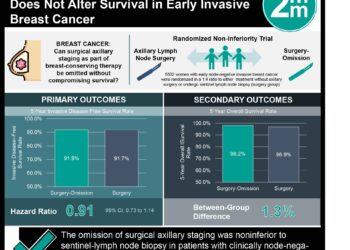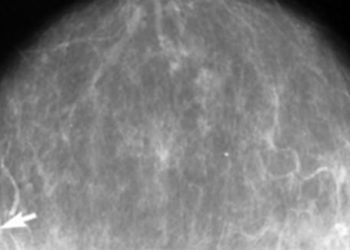Combination therapy with alisterib and fulvestrant may be clinically advantageous in the treatment of endocrine-resistant advanced breast cancer
1. Compared to alisertib alone, adding alisertib to fulvestrant did not increase objective tumour response rates to treatment nor progression-free survival.
2. Patients undergoing combination therapy were slightly more likely to demonstrate clinical benefit than those who received fulvestrant alone.
Level of Evidence Rating: 1 (Excellent)
Study Rundown: Although treatment options for breast cancer have evolved considerably in recent years, endocrine resistance via loss of estrogen receptor expression in advanced disease remains a persistent challenge and is associated with poor clinical outcomes. Recent work with the Aurora A kinase (AURKA) inhibitor, alisertib, has demonstrated promising results, reprogramming malignant mesenchymal cells as estrogen-sensitive epithelial cells. Alisertib has generated interest in preclinical breast cancer models and a tolerable safety profile in early human trials. The present trial sought to evaluate the role of alisertib monotherapy versus in combination with fulvestrant, an endocrine-receptor antagonist, in patients with endocrine-resistant advanced breast cancer.
Data from 91 patients were analyzed in total. In the alisertib monotherapy arm, patients completed a median of 6 cycles, and 94% had discontinued the drug at the point of analysis. The overall survival rate at 1 year was 75%. In the intervention arm, 95% of patients had discontinued the drug after completing a median of 4 treatment cycles. The overall survival rate at 1 year was 62.7%. In the monotherapy arm, there was no significant difference in overall survival based on estrogen receptor expression, although survival was better in AURKA-negative tumours than AURKA-positive tumours.
This study by Haddad et al. demonstrated little difference in tumour response and overall survival in patients with advanced, endocrine-resistant breast cancer treated with alisertib monotherapy versus alisertib in combination with fulvestrant. However, clinically significant antitumor activity was noted in both groups of patients with alisertib treatment. Strengths of this study include the biological plausibility of the hypothesis and consistency of these results with other studies, which certainly merits further study of alisertib. These findings are limited by the stringent eligibility criteria and the high rate of drug discontinuation.
Click here to read this study in JAMA Oncology
Relevant reading: Molecular mechanisms of endocrine resistance in estrogen-receptor-positive breast cancer
In-Depth [randomized controlled trial]: A randomized, phase II trial was performed in the United States. Postmenopausal women with estrogen receptor-positive (ER+/ERBB2− or ER−/ERBB2−) metastatic breast cancer with a history of ER+/ERBB2− disease were eligible. Patients also had to have been treated with fulvestrant in the past and had measurable disease. Estrogen receptor positivity was defined as 10% or greater positive cellular response on standard assay. Patients unwilling to give up alcohol intake, those experiencing visceral crisis or patients who had tried three or more chemotherapy regimes for metastatic breast cancer in the past were excluded. Patients were randomized in a 1:1 fashion to the intervention group (alisertib and fulvestrant) or the control group (alisertib monotherapy).
Patients received 50mg of oral alisertib twice daily on days 1-3, 8-10 and 15-17 of a 28-day cycle. Those in the intervention group received an intramuscular injection of fulvestrant on day 1 of each cycle and day 15 of the first cycle. Patients were enrolled between February 2018 and November 2019, with a halt in enrollment between April and June of 2018 due to concerns about alisertib’s tolerability; during this time, study enrollment criteria were modified to exclude patients with other severe health concerns.
Reasons for alisertib discontinuation included: disease progression (82.6%), intolerability (4.3%), death (4.3%) or physician judgment (2.2%). The 1-year overall survival rate was 75.1% (95% confidence interval 63.4%-89.0%). In the intervention group, reasons for discontinuing treatment include disease progression (68.9%), intolerability (13.3%), noncompliance (8.9%), new primary cancer diagnosis (2.2%) and death (2.2%). Overall survival at 1 year was 62.7% (95% confidence interval 49.7-79.0%). 45.9% of patients who experienced disease progression in the monotherapy arm eventually crossed over to the intervention arm; of these, only one patient experienced a partial response to combination therapy.
Progression-free survival was not different based on estrogen receptor status in the monotherapy arm (hazard ratio [HR] 1.79, 95% confidence interval [CI] 0.77-4.99) but was higher in AURKA receptor negative compared to positive tumours (HR 0.25, 95% CI 0.10-0.62). In the combination arm, there was insufficient evidence to conclude that PFS differed regarding either ERα expression (HR, 2.27, 95% CI, 0.84-6.14; Figure 3B) or AURKA expression (HR, 0.48, 95% CI, 0.21-1.10).
Image: PD
©2023 2 Minute Medicine, Inc. All rights reserved. No works may be reproduced without expressed written consent from 2 Minute Medicine, Inc. Inquire about licensing here. No article should be construed as medical advice and is not intended as such by the authors or by 2 Minute Medicine, Inc.







